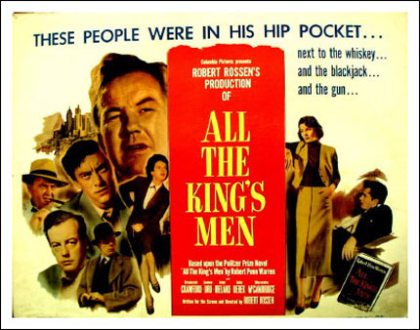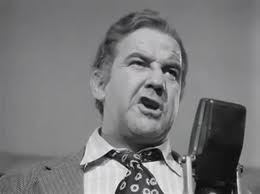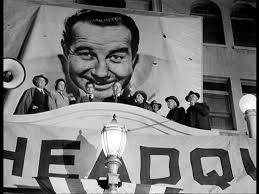
There aren’t any good All About Eve posters floating around, that I could I find, so we’ll just make do with the DVD cover
“Fasten your seatbelts, it’s going to be a bumpy night,” Margo Channing (Bette Davis) preparing a party for one of her diva tantrums, All About Eve.
“Margo is a great star, a true star. She never was or will be anything less or anything else.” – Addison DeWitt (George Sanders), giving his only compliment, All About Eve
Another cynical movie – and another movie starting with the word All – won best picture in 1950. While 1949’s winner All the King’s Men looked at the fakers and showmen in politics, 1950’s Best Picture, All About Eve, turned the camera’s gaze on those who are paid to be fake for a living – actors and the “real life” behind show business itself. The movie is actually a rather sleazy story told in a distinguished way with great actors (or ACT-tors, as they’d see in a theater) so it comes off much more classy than it really is. Either way, I think All About Eve is a fantastic movie, full of sharp characters who reel off nasty one-liners and put-downs.
All About Eve begins when young, practically penniless Eve Harrington (Anne Baxter) meets her idol, renowned Broadway dramatic actress Margo Channing (Bette Davis, one of the greatest actresses of all time and the owner of the namesake “Bette Davis Eyes” in a song thirty years later). Channing is a grand diva of the stage, abusing friends and servants (who are basically one and the same), turning a snobby nose up on the audiences who come to see her and basically throwing tantrums at the drop of a hat. But Eve’s sob story (she’s a young war widow who has been following Channing’s performances around the country) touch Margo and she hires Eve as a secretary.
At first everyone loves the overly humble, mousy little assistant who “just wants to help the great Miss Channing” but Margo begins to suspect Eve’s motives aren’t entirely selfless. Eve is just a little too good at her job; she increasingly oversteps her bounds to “assist” Margo, such as arranging a party for Margo’s absent boyfriend, play director Bill (Gary Merrill). Margo’s friends – like Bill and her best friend Karen (Celeste Holm) and her husband writer Lloyd Richard (Hugh Marlowe) – chalk Margo’s distrust to Eve to her wildly temperamental nature. Eve, pleasant as always, slides into a plum role as Margo’s understudy on her most recent play, and suddenly the audience begins to believe Margo may not be entirely incorrect about young Eve’s motives.
All About Eve is likely the most catty movie to every win best picture. The film is narrated by Addison DeWitt, a theater critic no one in the movie can stand, and who comments on every piece of action with a jaded, snide putdown. Although the movie’s pedigree of stars (particularly Davis) and surface subject matters (the world of theatre) might lead one to think it’s a highbrow drama, the movie is actually fairly scandalous and lurid (in a 1950s way), a backstage drama full of backstabbing, spoiled divas, drunken rants and even infidelity (One thing I’ve realized watching these movies is that Hollywood was NEVER as prudish as later generations have made it out to be – although the Richards do sleep in separate beds).
Many of the movie’s themes and conflicts are still major issues today! Margot struggles with the eternal conflict of feeling pulled between a career and family life (this being 1950, she ultimately chooses family, of course, and Eve is vilified for pursuing a career, but the conflict is there). The movie also is pretty frank about discussing show business’s fascination and glorification of youth (Margo openly admits to being too old for the parts she is playing but can’t find any good parts that are age appropriate – EXACTLY like today’s Hollywood!).
The movie also rather smartly deconstructs one of show business’s most cherished myths – the young ingénue plucked off the street who finds instant stardom. While Eve initially appears innocent, we learn she is duplicitous and has been scheming to become famous for a long time and is willing to betray anyone she has to in order to achieve her goal. Even though the movie is set in the world of theater, its primary themes and conflicts ring just as true for the movie business.
Trivia: All About Eve is not the only show biz satire nominated for Best Picture in 1950. The similarly themed Sunset Boulevard – satirized Hollywood in much the same way All About Eve did the theater. Ironically, Sunset Boulevard eventually became a play on Broadway.
More Trivia: All About Eve set a record for most nominations – 14, a record it still holds along with Titanic.
Other Oscars Won: Best Supporting Actor, George Sanders; Best Costume Design; Best Director; Best Writing, Screenplay; Best Sound Recording
Other Notable Movies released in 1950: Sunset Boulevard*; Born Yesterday*; Father of the Bride*; King Solomon’s Mines*; Cinderella#; Annie Get Your Gun; Harvey; Cyrano de Bergerac;
*Best Picture Nominee
#Top Grossing movie of the year




